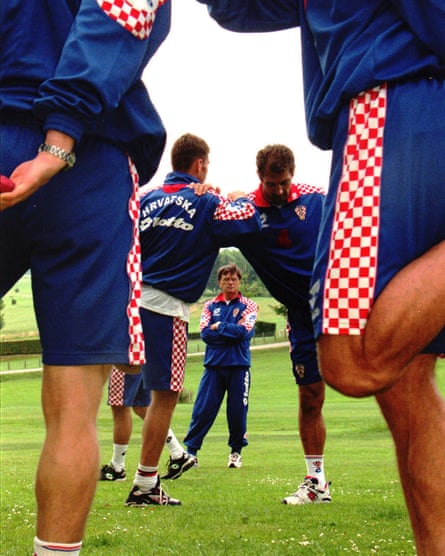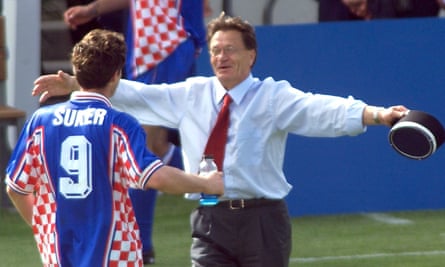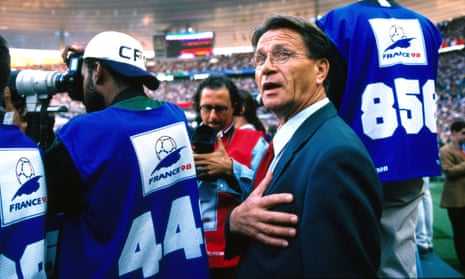You didn’t really interview Miroslav “Ciro” Blazevic. You just sat there, tossed some vague conversational gambit into the air and waited for the charismatic rush of anecdote to sweep you along, which was pretty much how he coached. He had extraordinary energy – at 75 he went to China to manage the national under-23 side, and had four jobs after that – and a profound love of football. But what he enjoyed most of all was to talk, particularly about himself.
Even 18 months ago, weakened by the cancer that eventually led to his death on Wednesday, two days short of his 88th birthday, Blazevic gave a lengthy interview for the documentary Croatia: Defining a Nation, and his part in leading the country to third place at the 1998 World Cup. It was as though by talking about his greatness and the greatness of those around them, he could make them great, could talk worlds into existence.
An ethnic Croat, Blazevic was born in Travnik in what is now Bosnia and Herzegovina and, after an unexceptional playing career, became coach of Vevey in the regionalised third flight of Swiss football in 1968. One day a cleaner found him working late and asked what he was doing. “One day,” he said, “I will become national coach of Switzerland.” She laughed. “Yes, of course you will,” she said. “And one day, I will become Miss Switzerland.” He was right; she wasn’t.
“He would always say he was the best in the world,” said Slaven Bilic, a key part of the Blazevic’s 1998 side. “I’m not saying he was a bad coach or a great coach, but he was the ideal coach for us. Put [Fabio] Capello, [Alex] Ferguson, [Arsène] Wenger in our team and it wouldn’t have worked like it worked with him. He was everybody’s father, a great motivator.
“We didn’t need a coach to teach us how to pass the ball, that kind of thing; he was ideal for us. You would play against, let’s say, Estonia, and you know, it’s Estonia, away. But he would gradually motivate you. He knows every day in his head: ‘Look, I’m going to make a small incident to wake everybody up a bit, and then I’m going to do this, then I’m going to tell them to go out to a nightclub’ – then at team meetings he’d be talking about Estonia like it’s fucking Brazil. You know he’s lying; you know it isn’t true, but you say, fuck, yeah, it’s going to be hard.
“And he would always say, ‘OK, Estonia’s left-back is whoever,’ and he’s talking about their players, and he’s writing their names, and you know it’s wrong, and you know he’s saying: ‘This guy, he’s so quick, he’s so good’ – and you know when he’s talking to you that he’s never seen him in his fucking life.”

But it worked. Croatia, emerging from war, qualified for Euro 96 and then the 1998 World Cup where in the quarter-final they faced Germany, the side that had eliminated them at the same stage two years earlier. “I spent the whole night thinking about theory,” Blazevic recalled. “I had a problem with [Oliver] Bierhoff because I didn’t have a skilled player who could beat him in the air, so I had to stop the crosses coming in. I was thinking about telling the players the story about Rommel and Montgomery. Rommel was much, much better in strategy, but he didn’t have fuel. So the tanks couldn’t move and Montgomery wins.
“I was on my way to the dressing room with my theories, and I looked at myself in the mirror and I was a kind of green colour. So I thought: ‘Oh my God, am I going to die?’ I went to the room where the players were waiting for me – [Davor] Suker, [Zvonimir] Boban, [Alen] Boksic … and I had everything drawn on sheets of paper, but I didn’t start to talk about anything. I couldn’t, because I was thinking: ‘Was I going to die?’ I was looking at the players and there was silence in the dressing room, and after a few moments I saw that they were the same green colour as me.
“My theory was seven or eight minutes long, and I knew I wouldn’t be able to keep their attention. They were getting more and more green. So I crumpled my sheets of paper and threw them down. Fuck the theory. So I just said: ‘You have to go out and die today for the Croatian flag and all the people who have given their lives.’ No dealing with Bierhoff, nothing. You have to understand the psychology of the players. You have to have that sort of relationship with the team, so you can communicate your state of soul. 3-5-2, 4-4-2 – this is bullshit. What is most important is if they decided to win or not. Are they willing to die on the pitch or not?” And of course they won, 3-0.
after newsletter promotion
But Blazevic was nothing if not contradictory. Formations mattered an awful lot when it came to his work pioneering a back three. “I was in the avant-garde,” he said. “Everybody played 4-4-2 and I invented 3-5-2. In 1982, I won the Yugoslav championship with Dinamo Zagreb with 3-5-2. And after that the Germans picked it up. It came completely out of nowhere. I had to invent the system because I had a different kind of player in my team. You need elementary organisation and cohesion between the lines. When the opposition has the ball all three lines should be within 20 metres, and you make group attacks on the opposition players. When we win the ball, more and more expansion of the lines, more and more width. There is no depth without width.”

Didn’t Carlos Bilardo claim to have invented 3-5-2 with Argentina? “What does that prick know? What year was that?” But it was said with laughter. He knew he was talking self-aggrandising nonsense and he knew I knew he was talking self-aggrandising nonsense but somehow, as Bilic said, it didn’t really matter. If Blazevic said it, you could believe it enough to make it true, and that was how he turned ideas and ambitions into reality.

Comments (…)
Sign in or create your Guardian account to join the discussion